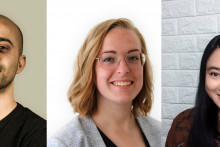Issues related to mental health and working conditions of PhD candidates are mentioned throughout the Annual Review 2019 of UT’s Occupational Health Service Arbo Unie. PhD researchers Anton Atanasov (President of P-NUT) and Guido Peters (P-NUT board member) offer their response to the report and its findings.
The Arbo Unie report states that ‘staff, and more especially PhD candidates, can find it difficult to approach their line manager with problems or to seek help. They are afraid of being labelled as having ‘issues’.’ Do you recognize this?
Guido Peters: ‘Yes, absolutely. We have heard about this issue many times. However, it is specific to individual supervisors, it is not universal. That makes it difficult for us to act on it. We try to work with Twente Graduate School (TGS) to improve supervision practices, but it remains a difficult issue to tackle.’
Anton Atanasov: ‘For us, as P-NUT members, it is like a balancing act. We have certain limitations, a threshold of efforts we can put in. We collect information but each case is very specific. We have to aggregate and distil the common patterns. Once we know the patterns, the TGS and the UT in general are more willing and more able to help.’
Why do PhDs have issues with approaching their supervisor? Are there some common themes you have observed?
Peters: ‘I quite often hear of issues related to educational responsibilities. Teaching and workshops are often handed to PhD candidates, even though they are not contractually obligated to carry out such tasks. But even though it is not in their contract, it is often communicated to them that they are expected to teach and spend time on educational activities. In such situation, it is very difficult for a PhD to say no. If they do say ‘no’, work can become difficult for them.’
Arbo Unie advices that the UT offers ongoing support for PhDs, for example in a form of a buddy system. Do you agree?
Atanasov: ‘I think it is a very good recommendation. We came to a similar conclusion in our survey. However, as the report also mentions, the big challenge is translating policy into action. Even if we have the policy, there is the question: will it fall flat or will it actually be implemented?’
Peters: ‘A buddy system for PhDs was actually implemented here for a while but it was short-lived. It’s good that it has been brought up again and I hope it makes a comeback. I think it’s especially important for international PhDs. It can help them with all the practical hassles, such as administration, and it can introduce them to social groups and build social support systems.’
In your eyes, what should the ongoing support for PhDs look like so it is actually helpful?
Atanasov: ‘It should reduce the apparent boundaries of discussing any sort of issues, whether personal or professional. The discussion shouldn’t be as formal as it is. Now, if you need to seek help, you have to send a detailed email to a bunch of people. There should be a more casual process that allows you to simply stop by an office and say ‘I’m not feeling well’ – without the fear that it might endanger your work. Seeking help shouldn’t be such a formal process.’
'Seeking help shouldn't be such a formal process'
Peters: ‘Indeed. Mental health issues still seem to be somewhat taboo and stigmatizing. Working overtime is considered the norm. This needs to change, but that will of course take time.’
Based on the Arbo Unie review, ‘in 2019 their psychologist saw remarkably few PhD students at her consultations’. Why do you think that is?
Peters: ‘I believe that a lot of people internalize their issues. When I talk to some PhDs, I see it takes a long time before they seek help. Often also because they don’t see how a confidential advisor or counsellor can help them.’
Atanasov: ‘There is also a certain aspect of naivety. Many people start their PhD right after their bachelor and master studies. They still have the student life mindset and they don’t know any different. They think it’s normal to pull all-nighters and it takes them a long time to realize that they need to take better care of themselves.’
Peters: ‘Mental health among PhDs is an important topic and an issue that the Arbo report raises. It is an issue we have been aware of for some time, but didn’t have sufficient evidence of. In a way, it provides additional evidence to what we knew already.’
'We should not allow the Covid-19 pandemic to hide these underlying issues'
Atanasov: ‘I really hope we don’t forget these findings. We should not allow the Covid-19 pandemic to hide these underlying issues.’
What do you think should be the UT’s next step based on this report?
Peters: ‘I certainly hope they will implement the recommendations. Moreover – as the report also says – the UT often acts in a reactive way. The university should be more proactive. It should move from a problem-based mindset towards one of continuous improvement.’
Atanasov: ‘I agree completely. We need a culture of self-improvement, but that will only come if the UT is more transparent about the challenges it faces. They need to admit that there is room for improvement. On the other hand, we’d like more PhD proactivity as well. We can’t just sit around passively and wait for the world to change around us. All faculties need a stronger spirit of activism. We want to create this culture and be part of the change. Improvement goes both ways. As PhDs, we need to do our part as well.’







